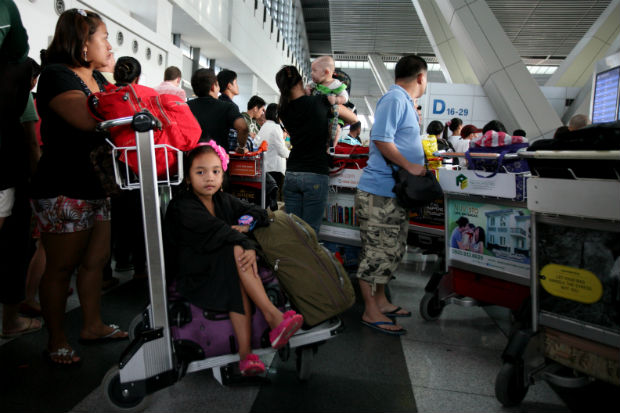
Passengers wait for their flight at Naia Terminal 3, Pasay City.INQUIRER FILE PHOTO / KIMBERLY DELA CRUZ
The air passengers rights bill in the House of Representatives hurdled the committee level on Tuesday.
The House transportation committee approved the bill which lists down the rights of passengers to full and truthful information on the contract of carriage, to fair and reasonable fare and value of service purchased, against any act of discrimination or vexation, and the right to safety, to redress and compensation, among others.
Among the salient provisions of the bill is the right to redress and compensation. Under the bill, passengers have the right to be properly and expeditiously compensated in case of delays or cancellation of flights.
The bill states that all passengers have the right to be compensated for delayed flights. Such compensation includes meals and refreshments, free phone calls, text or internet service and first aid, among others.
The delays which demand compensation include terminal delay and tarmac delay.
The bill also enumerates the rights of passengers of cancelled flights. The compensation includes meals and refreshment, hotel accommodations near the airport, transportation service between the airport and the hotel accommodation, and free telephone calls, text, fax messages or e-mails, among others.
Passengers whose flights were cancelled because of the fault of the air carrier also have the right to be reimbursed within five days, by electronic bank transfer, bank orders, or bank checks, travel vouchers and other services, of the full cost of the ticket for the part of the journey not made.
In situations flights were cancelled because of safety and security reasons, passengers have the right to rebook the trip to another future trip, be reimbursed of the value of the fare, or be endorsed to another airline.
The bill also states that a passenger cannot be denied boarding except on immigration issues, safety, security and health concerns. If a passenger is denied boarding because of overbooking, the passenger has the right to be compensated with refund, rebooking, or endorsement to another carrier.
In a statement, Bayan Muna Rep. Neri Colmenares urged the House leadership to have the bill approved on third reading by November in time for the holiday season when an influx of passengers is expected.
“The bill seeks to remedy the abuse of airlines of passengers who suffer delay and cancellation. The bill provides for 20 percent discount on airfares to senior citizens, PWDs and students. It also requires airlines to reimburse 75 percent of the fare as long as the passenger cancels the flight at least 24 hours before departure .It also requires airlines to provide refreshment for a 2-hour delay including free phone or internet and hotel for cancelled flights,” Colmenares said.
“As an author of the bill, I hope the House leadership will have it approved before Nov 1. The House Transportation Committee fast tracked the passing of the bill for this reason and I hope that the House leadership would support this very timely and just bill,” he added.
During the hearing, some airline carriers expressed reservations on the bill, which would essentially implement the already existing passenger bill of rights enshrined in the joint administrative order of the Transport and Trade departments.
“We feel that the Executive branch is in the best position to deal with this topic and has the greatest flexibility in responding to the fast changing environment of aviation,” International Air Transport Association (IATA) country manager Roberto Lim told lawmakers.
Philippine Airlines vice president for external affairs Ma. Socorro Gonzaga said while the bill may not have an effect on fares, it will have to be considered in the “cost of doing business.”
She added that the airline has been offering compensation measures already.
The bill sets punitive measures on errant airline companies. Failure to comply with the passenger bill of rights may result in the suspension or even revocation of franchise or license to operate. Violations under the bill may also be penalized under related laws. such as the Consumer Act, the Civil Aeronautics Act, among others.